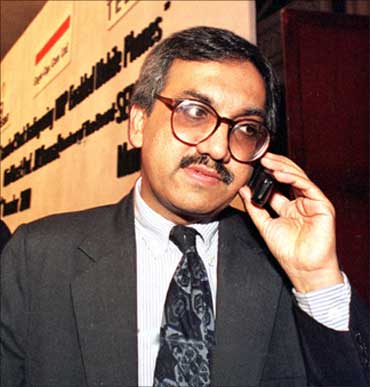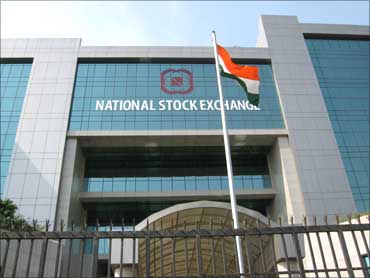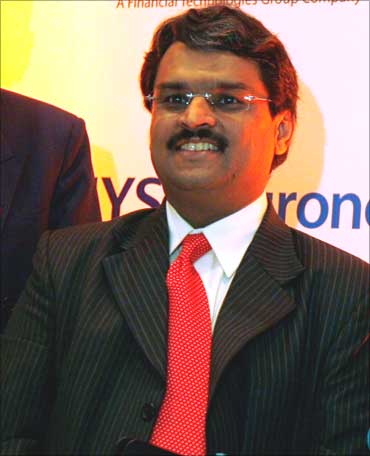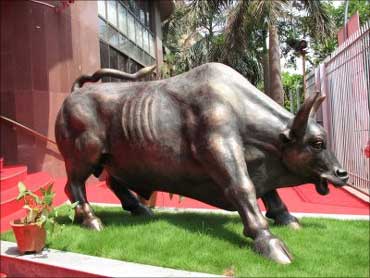
They crossed swords when each launched a commodities exchange; then fought again over the rules for currency trading, and battled it out for control of smaller markets, like power trading.
They are in court over allegations of unfair conduct, and have lobbied against each other in the corridors of the finance ministry in New Delhi's North Block.
Now, even as court hearings resume in the battle between the MCX Stock Exchange (MCX-SX) and the stock market regulator, MCX's real target is the National Stock Exchange.
But the specifics of these proliferating battles are the less interesting story; it is the warriors who make this a potential successor to the Ambani-Wadia saga of the 1980s.
On the one side, there is Ravi Narain, managing director of the National Stock Exchange, cast as the Cambridge- and Wharton-educated insider.
On the other side is the home-grown Jignesh Shah, a Bombay University engineer who did grunge work for many years in the bowels of the Bombay Stock Exchange before promoting Financial Technologies (FT), which then spawned the Multi-Commodity Exchange, or MCX.
...

Narain is what the Japanese would call a "salary-man", but with a salary and bonus package that would be the envy of any executive, and would not seem out of place in any plush Mumbai drawing room.
Shah in contrast is a "business-man" who has the permanent air of an outsider intent on crashing into the party.
He declared years ago that he would be a billionaire before he turned 40, a goal he missed narrowly before the markets crashed. Friends and foes compare him with Dhirubhai Ambani, for different reasons of course; Shah merely shrugs that the system is not friendly to first-generation businessmen.
The differences in style are equally contrasting. While Narain is not known to be particular about the brand he or his employees wear, Shah insists that his senior management wear suits stitched from the finest fabric available at Gabbana, a premier clothing store and a favourite with Mumbai's business community.
However, there are similarities as well. Both have a fierce fighting spirit, which is more than evident from the way they have built their institutions.
Since they are in the same business space, it was inevitable that their paths would cross. And they did. Often.
...

The first round went to Shah, whose MCX comfortably beat the NSE-sponsored NCDEX when it came to commodity trading volumes, though NCDEX may complain that the numbers should not be taken at face value.
As it happened, most of the brokers using NSE's terminals used FT's proprietary technology, and it wasn't long before NSE began to apply a squeeze.
MCX quickly went to court, alleging lack of fairness even as NSE cited deficiencies in FT's software.
So when MCX Stock Exchange (MCX-SX), India's newest stock exchange, blamed "some elements for spreading misinformation to undermine our reputation and business for their benefit" in an advertisement some weeks ago, there were no prizes for guessing who was in its sight.
The exchange has often charged NSE with being a monopolist. NSE did not hesitate in returning the compliment, by portraying the new kid on the block as someone who does not always play by the rules.
Ironically, that is the substance of the charge that MCX-SX has brought against the stock market regulator for dragging its feet and not allowing MCX-SX to start trading, even though it says it has met all the pre-conditions.
MCX-SX's frustration over the market regulator's delay in giving the green signal was accentuated by a monthly loss of Rs 4.7 crore (Rs 47 million) - a claim it mentioned in the petition filed against the Securities and Exchange Board of India (Sebi) in the Bombay high court last month.
...

MCX-SX people say privately that if they are allowed to start trading in stocks, they will put NSE in its place in the same way that MCX has bested NCDEX in the commodities space, having grabbed 85 per cent of trading volumes, before Shah once again bested Narain in currency trading with a 60 per cent market share.
There is no doubt that NSE, under Narain, after replacing the Bombay Stock Exchange as India's premier bourse, has built a formidable reputation for the quality of its trading environment. It has built up a near-monopoly in stock derivatives.
Its benchmark index, the 50-share Nifty, is becoming a global asset. It has marquee foreign financial houses as its shareholders. And it has about 75 per cent market share in the equity cash segment, and nearly all of the equity derivatives segment.
So if Shah were to launch a stock exchange that overtook NSE, it would make him king of the exchanges, and NSE would be de-throned.
But the highest stakes may well be in the battle over software. FT's software ODIN, the major revenue earner for the company, is used by 80 per cent of NSE's stock brokers.
The battle started when NSE put ODIN on its watchlist and rejected FT's application for new installations or licences.
FT moved court, saying NSE acted with the mala fide intention of stifling competition. If NSE wins this one, it would under-cut Shah's revenue base, and the foundation of his business. The case is on.
...

Meanwhile, Shah is already the winner in smaller markets. Take spot power trading, where the Indian Energy Exchange, promoted by FT, enjoys 90 per cent market share. NSE- and NCDEX-promoted Power Exchange of India is a distant second.
Technology is another area where the two have crossed swords; Each is also desperate to outdo the other in the yet-to-be-started SME segment.
MCX is known to be internally stressing the SME segment, for which its hub-and-spoke model is well known; NSE is looking to leverage partner London Stock Exchange's expertise.
LSE operates one of the largest platforms for the SME segment, known as AIM.
Fight for global footprint
Meanwhile, the protagonists are circling the globe. If Narain was busy in Tokyo last month to explore listing of stock index futures on the Tokyo Stock Exchange, Shah was busy in Singapore, gearing up for the launch of the Singapore Mercantile Exchange, scheduled to go live soon.
His plans to start multi-asset exchanges in Mauritius, Bahrain and Botswana have already missed their deadlines, but things seem to be falling in place.
While Mauritius may go live in September, the Bahrain exchange is scheduled to start in October.
Narain, on his part, has not been allowing the grass to grow under his feet. A few months ago, NSE tied up with the Chicago Mercantile Exchange for a product swapping deal.
Before that, it achieved huge success at the Singapore Stock Exchange. Exchange-traded funds based on NSE's index are already traded on seven other global exchanges.
...

NSE signed a letter of intent last month with LSE to explore a cross-listing agreement.
Under this arrangement, FTSE group may license its FTSE 100 index to NSE and the Indian bourse may license Nifty to LSE for issuing and trading options and other index contracts.
That may cause heartburn in MCX-SX. A year ago the exchange had signed an agreement with FTSE, a company jointly owned by Financial Times and LSE, to bring its global indices to MCX-SX and create new domestic Indian indices.
That plan has now been delayed due to the market regulator's silence on its application to start equity trading.
If NSE's cross-listing agreement with LSE materialises, it may have the first-mover advantage in derivative contracts based on FTSE 100 before MCX-SX offers similar contracts on its platform. This loss of opportunity, due to what MCX calls unfair delay by the regulator, is what is rankling the group.
The next hearing in the case against Sebi is scheduled for August 10. No one knows whether MCX-SX's allegations against the "elements" are justified, but it is clear that the fireworks have begun, and will continue to light up the skyline of Mumbai's markets.